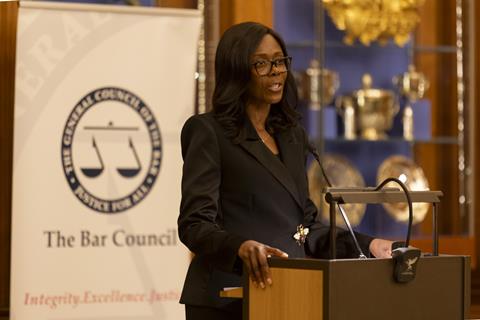Following Harriet Harman’s damning independent review into misconduct, bar chair Barbara Mills KC says this is a ‘once-in-a-generation opportunity to change its culture’
An independent review into bullying, harassment and sexual harassment, commissioned by the Bar Council, this week revealed a ‘cohort of untouchables’ and no confidence in the complaints system at the bar.
Long-serving former minister and MP Harriet Harman, a solicitor, told the Gazette that all 36 of her recommendations would need to be acted upon to ensure ‘zero-tolerance and accountability’.
Her recommendations fall into several broad categories: the code of conduct and standards of behaviour; complaints handling; the duty to report serious misconduct; protection and safeguarding of students and pupils; overcoming barriers to reporting bullying, harassment and sexual harassment; tribunal proceedings; sanctions; online abuse; and judicial bullying.
Harman also recommends clarifying the scope of professional misconduct and appointing a conduct commissioner to tackle bullying, harassment and sexual harassment at the bar. She also suggests audio recording all proceedings to improve accountability and for the Bar Standards Board to talk to the Solicitors Regulation Authority about its ‘explicitly clear’ code of conduct covering bullying and harassment.
The review received ‘abundant, disturbing and compelling accounts of judicial bullying’. Harman says this has something the judiciary is ‘yet to plainly and explicitly acknowledge’.
The ‘culture of impunity for those at the top who commit misconduct’ is the problem, Harman added. ‘Those who are subjected to it feel unable to complain. All the jeopardy is on them. Those in powerful positions, whether at the bar or in the judiciary, who choose to engage in bullying, harassment, or sexual harassment can be pretty confident that nothing will be done. And that is what must change. The jeopardy must change from the victim to the perpetrator.’
She expressed concern ‘that there may be an inconsistency of approach’ in tackling online bullying and harassment, saying ‘robust action’ must be taken. ‘Abuse on social media is no more acceptable than abuse on the steps of the court or any other public forum.’
'Those who are subjected to [misconduct] feel unable to complain. All the jeopardy is on them. Those in powerful positions, whether at the bar or in the judiciary, who choose to engage in bullying, harassment or sexual harassment can be pretty confident that nothing will be done'
Harriet Harman
Bar chair Barbara Mills KC (pictured below) said the report made for ‘uncomfortable reading’, adding: ‘It’s imperative that all barristers have a safe working environment to deliver best outcomes for their clients. It is everyone’s responsibility – in all parts of the profession, no matter how junior or senior – to create and foster that safe and inclusive working environment.’ She told the Gazette she had ‘every hope’ and was ‘optimistic that we will, together, create the change’ the bar seeks.
However, she disagreed with Harman’s criticism that Talk to Spot, an online tool for raising confidential concerns about bad behaviour, lacked teeth.

‘Talk to Spot is a valuable mechanism,’ she said. ‘It is working to the extent that it provides us with [information on the] types of incidents going on at the bar. It also allows us to communicate with those who get in touch. The recommendation is not to change Talk to Spot but to make clear what it does and does not do. From our point of view, it does quite a lot. It is able to reach those people who have been bullied or treated badly to help them figure out their options. People need to know more about it.
‘We commissioned this review because we know there is a problem. It is clear that decisive action is required. We will consider these recommendations carefully and develop a plan for change. On the basis of the many conversations I have had with the senior judiciary and the work they have already undertaken in this area, I am confident that we will work together to bring about necessary change. This is a once-in-a-generation opportunity for the bar to change its culture.’
There is much to do, but Mills is confident the council can ‘drive change’. She said the report would not be ‘sitting on a shelf gathering dust’.
‘The consequences of [bullying, harassment and sexual harassment] can be devastating… serious and significant. I stand with those who felt silenced by this issue. Every barrister knows that dishonesty is not acceptable in the profession – we need to raise bullying and harassment to the same levels. We need to change the culture by making it clear what the boundaries are, what the red lines are. Stakeholders have made it plain to me that everybody recognises there is a problem and everybody wants to fix it. I have every hope – and I am optimistic – that we will, together, create the change. We stand ready.’
This article is now closed for comment.




































4 Readers' comments